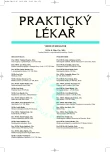Benign paroxysmal positioning vertigo - a diagnostic problem?
Benigní paroxysmální polohovací vertigo - diagnostický problém?
Benigní paroxysmální polohovací vertigo (BPPV) je onemocnění vnitřního ucha projevující se polohově vázanou závratí paroxysmálního charakteru při zcela specifickém pohybu hlavou. V práci je na podkladě kazuistického sdělení případu 56tileté pacientky shrnuta problematika diagnostiky benigního paroxysmálního polohovacího vertiga s zaměřením na možné diagnostické obtíže.
Klíčová slova:
Vertigo, polohové vertigo, paroxysmální vertigo
Authors:
P. Vrabec
Authors‘ workplace:
FN Motol
; Přednosta: prof. MUDr. Jan Betka, DrSc.
; Klinika otorinolaryngologie a chirurgie hlavy a krku 1. LF UK
Published in:
Prakt. Lék. 2006; 86(12): 705-707
Category:
Case Report
Overview
Benign paroxysmal positioning vertigo is a balance disorder of the inner ear. Paroxysmal vertigo is caused by specific head movements. The author presents an overview of the knowledge of benign paroxysmal positioning vertigo using one 56 year-old patient as a case study.
Key words:
Vertigo, positional vertigo, paroxysmal vertigo
Labels
General practitioner for children and adolescents General practitioner for adultsArticle was published in
General Practitioner

2006 Issue 12
- Advances in the Treatment of Myasthenia Gravis on the Horizon
- Hope Awakens with Early Diagnosis of Parkinson's Disease Based on Skin Odor
- Memantine in Dementia Therapy – Current Findings and Possible Future Applications
- Memantine Eases Daily Life for Patients and Caregivers
- Possibilities of Using Metamizole in the Treatment of Acute Primary Headaches
-
All articles in this issue
- Role of coronary calcium scoring in a spectrum of examination procedures
- Restoration of hand movement following irreparable radial nerve palsy
- Prevalence and longitudinal trends in prescription of potentially inappropriate medications for the elderly in the Czech Republic
- Family structure and life style of Czech children
- Reasons for admission into old people’s homes.
- Hyperhomocysteinemia and ischemic stroke
- Stem cells in patients with heart failure following myocardial infarction
- Occupational viral hepatitis in southern Moravia from 1988 to 2004
- Comments from healthy people that may stress patients
- Neurosyphilis
- Choroidal detachment as a first sign of a haematological malignancy
- Benign paroxysmal positioning vertigo - a diagnostic problem?
- Severe lactic acidosis associated with acute renal failure in a diabetic patient treated with metformin – A case study.
- Is diagnosis of lyme borreliosis still difficult?
- General Practitioner
- Journal archive
- Current issue
- About the journal
Most read in this issue
- Severe lactic acidosis associated with acute renal failure in a diabetic patient treated with metformin – A case study.
- Role of coronary calcium scoring in a spectrum of examination procedures
- Restoration of hand movement following irreparable radial nerve palsy
- Neurosyphilis
